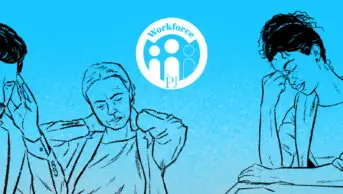
David Willis / Alamy Stock Photo
NHS England and NHS Improvement is tendering for a recruitment campaign “to increase the attractiveness” of careers in the NHS, including in the pharmacy sector, to mitigate staff shortages.
The contract notice, published on the government’s ‘Contracts Finder’ website on 5 December 2021, says the campaign is being developed as “hospitals, mental health services and community providers are now reporting a shortage of nearly 84,000 [full-time equivalent] staff”.
“Workforces are comprised of a wide range of roles, including pharmacy technicians/pharmacists,” it adds.
In addition to NHS healthcare roles, the campaign will also include “peer roles specifically for people with their own lived experience of the criminal justice system able to support others”.
The NHS contract, which is worth £70,000 and will run between 14 January and 13 April 2022, invites the successful bidder to “develop and deliver an England-wide campaign to increase the attractiveness of careers in NHS health and justice roles and encourage individuals to apply for them”.
The contract will include developing “recommendations on how to encourage people” into NHS roles, “advice on channels to reach target audiences” and “budget requirements for roll out”.
Pharmacists were added to the Home Office’s shortage occupation list in March 2021, after evidence suggested there was “a national shortage in this occupation due to a decline in the number of pharmacy graduates and increasing demand for their services”.
Following this, a report by the Community Pharmacy Workforce Development Group, published in June 2021, recommended that policy makers and professional bodies “undertake a programme of collaborative work to ensure community pharmacy is seen as an attractive career choice for future pharmacists”.
The report also revealed that 9% of FTE community pharmacist positions in England were vacant as of July 2020.
Representatives from the Company Chemists’ Association (CCA), National Pharmacy Association (NPA), Association of Independent Multiple Pharmacies (AIMP) and Pharmaceutical Services Negotiating Committee met with NHS England in October 2021 to discuss the workforce shortage in community pharmacy.
The trade bodies said in a subsequent joint statement that there was currently a “critical” shortage of pharmacists working in the community sector.
“This situation risks jeopardising patients’ access to care and cannot be allowed to continue,” it added.
Commenting on the contract notice, Gareth Jones, head of corporate affairs for the National Pharmacy Association, said: “It is good that the government recognises there is a problem and is taking this step. However, a publicity campaign does not by itself address the fundamental issue of underfunding and allocation of NHS resources.
“The NPA, CCA and [AIMP] recently launched a website at https://communitypharmacycareers.org/ to attract people into the sector, because we all believe that a career in community pharmacy can be inherently very fulfilling.”
In hospital pharmacy, 91% of 274 hospital pharmacists who responded to The Pharmaceutical Journal’s 2021 salary and job satisfaction survey said that a “lack of staff” was creating a barrier to doing their job effectively.
NHS England was contacted for comment.
Read more: Does community pharmacy have an image problem?
- This article was updated on 6 December 2021 to include comments from Gareth Jones, head of corporate affairs for the National Pharmacy Association
1 comment
You must be logged in to post a comment.



It’s very well explaining the supposed shortage but in fact there is not a shortage of pharmacists in the Uk, please look at the current Gphc register. It’s actually pharmacists choosing not to work in community due to workplace conditions and pay and lack of progression. Address that first and see how you can improve working conditions as that it the root cause of the so called shortage to which you refer to when in fact there isn’t a shortage, it’s just a shortage of pharmacists willing to work in community.